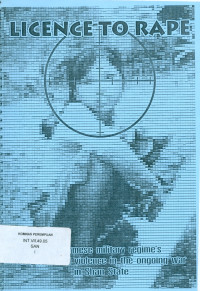
Text
Licence to rape: the Burmese military regime's use of sexual violence in the ongoing war in Shan state, Burma
The report details 173 incidents of rape and other forms of sexual violence, involving 625 girls and women, committed by Burmese army troops in Shan State, mostly between 1996 and 2001. The report reveals that the Burmese military regime is allowing its troops systematically and on a widespread scale to commit rape with impuntiy in order to terrorize and subjugate the ethnic peoples of Shan State. This report details 173 incidents of rape and other forms of sexual violence, involving 625 girls and women, committed by Burmese army troops in Shan State, mostly between 1996 and 2001. It should be noted that due to the stigma attached to rape, many women do not report incidents of sexual violence. Incidents may also not have reached SHRF, as information on human rights abuses in Shan State is gained from refugees arriving at the Thai-Burma border. Therefore the figures in this report are likely to be far lower than the reality. The report reveals that the Burmese military regime is allowing its troops systematically and on a widespread scale to commit rape with impunity in order to terrorize and subjugate the ethnic peoples of Shan State. The report illustrates there is a strong case that war crimes and crimes against humanity, in the form of sexual violence, have occurred and continue to occur in Shan State. The report gives clear evidence that rape is officially condoned as a 'weapon of war' against the civilian populations in Shan State. There appears to be a concerted strategy by the Burmese army troops to rape Shan women as part of their anti-insurgency activities.
The incidents detailed were committed by soldiers from 52 different battalions. 83% of the rapes were committed by officers, usually in front of their own troops. The rapes involved extreme brutality and often torture such as beating, mutilation and suffocation. 25% of the rapes resulted in death, in some incidences with bodies being deliberately displayed to local communities. 61% were gang-rapes; women were raped within military bases, and in some cases women were detained and raped repeatedly for periods of up to 4 months. Out of the total 173 documented incidents, in only one case was a perpetrator punished by his commanding officer. More commonly, the complainants were fined, detained, tortured or even killed by the military. Shan women are increasingly vulnerable to rape due to the increased militarization and anti-insurgency measures in Shan State by the Burmese regime, currently named the State Peace and Development Council (SPDC). The number of battalions in the state has nearly tripled since 1988. The majority of rape incidents were committed in the areas of Central Shan State where over 300,000 villagers have been forcibly relocated from their homes since 1996. Many rapes took place when girls or women were caught, usually searching for food, outside the relocation sites. Rapes also occurred when women were being forced to porter or do other unpaid work for the military, and when stopped at military checkpoints. The report also explores some of the physical and mental effects of the rapes on the survivors, who suffered not only from the lack of legal redress for the crimes, but also the lack of any crisis support. Some survivors faced blame and rejection from their own families and communities. Many of the survivors decided to flee to Thailand after being raped. However, the lack of recognition of Shan refugees in Thailand means these survivors have no protection, no access to humanitarian aid or counselling services. They are thus vulnerable to exploitation and trafficking and are in constant danger of being deported into the hands of their abusers.
Availability
| KP.IV.00041 | KP IV INT l | My Library | Available |
Detail Information
- Series Title
-
-
- Call Number
-
KP.IV.INT l
- Publisher
- Chiang Mai : Shan Human Rights Foundation., 2002
- Collation
-
127p. : ill. ; 30cm.
- Language
-
English
- ISBN/ISSN
-
-
- Classification
-
KP.IV
- Content Type
-
-
- Media Type
-
-
- Carrier Type
-
-
- Edition
-
-
- Subject(s)
- Specific Detail Info
-
-
- Statement of Responsibility
-
-
Other version/related
No other version available
File Attachment
Comments
You must be logged in to post a comment
 Computer Science, Information & General Works
Computer Science, Information & General Works  Philosophy & Psychology
Philosophy & Psychology  Religion
Religion  Social Sciences
Social Sciences  Language
Language  Pure Science
Pure Science  Applied Sciences
Applied Sciences  Art & Recreation
Art & Recreation  Literature
Literature  History & Geography
History & Geography